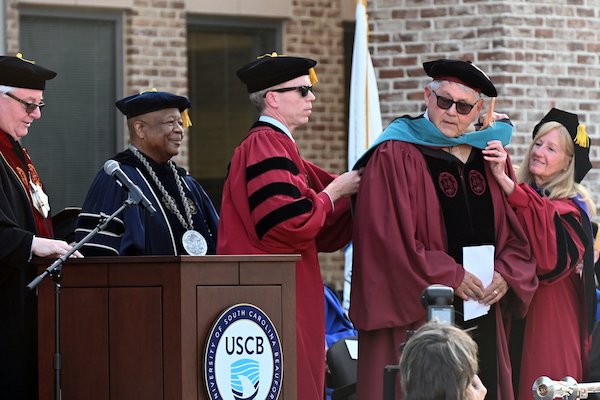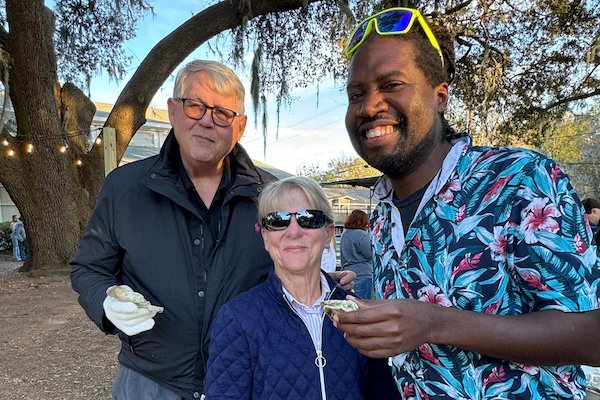Dick Stewart: A Driving Force for Higher Education
 Dick Stewart being awarded an Honorary Doctorate of Public Service from the University
of South Carolina at USCB’s Spring Commencement 2024.
Dick Stewart being awarded an Honorary Doctorate of Public Service from the University
of South Carolina at USCB’s Spring Commencement 2024.Dick Stewart believes in the far-reaching impact of higher education.
“My wife and I are both first-generation college students,” he explains. “Like many people in our age group, we found that the experience of a four-year college campus was life-changing. It informed us about ourselves and the world we occupied in ways that other things did not, and it provided opportunities and experiences for us that we think more people would benefit from having.”
This is why Stewart was a driving force behind the expansion of USCB degree programs and why he has been a steadfast supporter of the university for more than 20 years.
Stewart’s leadership role in USCB’s story reaches back to when he and his wife, Sharon, moved to Beaufort County in 1998 after a successful business career in the Atlanta area.
“To protect the cultural, environmental, and historic characteristics of this community, we had to have a high quality, comprehensive university. We were the fastest growing area and the only area without a four-year degree-granting university,” Stewart said.
For inspiration, he turned to the past and historic Beaufort College, which was founded by the county’s leading citizens in 1795 and thrived until the Civil War. So, Stewart formed Citizens for a Four-Year University with Courtney Worrell, a colleague at the property development firm he established in Beaufort.
“If we were going to have the kind of university and the kind of impact on this community that a university should have, it needed to be supported and funded by the local community and citizens who care about higher education,” Stewart said.
 Dick Stewart
Dick StewartStewart began working with former chancellor Dr. Jane Upshaw on grassroot forums to discuss the potential new university. This eventually led to legislative, community, county government and other local support — much like the founding of Beaufort College 200 years earlier.
One public forum stands out in Stewart’s memory. It was held at the Center for Fine Arts on the Beaufort campus. Onstage were a dozen dignitaries, including county council members, the commanding officer of the Marine Corps Air Station, school district leaders, and the area’s state legislators. In the audience was a full house of over 350 community members. The question put to them was “Do we need a four-year university in Beaufort County?”
According to Stewart, the answer from everyone on stage was a resounding “Yes” and the audience was murmuring support.
“When they each expressed their support for the new university degrees, which was an incredibly satisfying and exciting moment to see,” Stewart recalls. “Seeing the unanimity of support from the community, the elected leadership and our largest employers for USCB was a moment of joy!”
The effort culminated in 2004 when USCB officially opened its doors as a comprehensive, four-year institution. But Stewart’s backing of the university had only just begun.
Over the past 20 years, his unceasing leadership support has helped ensure that USCB thrives as an educational, cultural, and economic cornerstone of the region.
“This area has many things that are unique. Those things can inform the world and USCB Is the vehicle through which those things are best understood, can be protected, and can provide the focus of those activities and lessons that will benefit the world,” he said.
Stewart lists three distinct Lowcountry examples: Reconstruction, salt marshes, and Gullah Geechee culture.
“The Institute for the Study of the Reconstruction Era is a part of USCB, and wouldn't be here without it,” he said.
He points out that wars around the world are followed by periods of reconstruction and USCB is well-positioned to research and educate what has worked and what has not worked in reconstruction efforts.
Examples include the Mather School for daughters of formerly enslaved people which informs how educating women can change the lives and futures of families. Also, the Reconstruction Era National Historical Park has sites throughout the area.
“We have 150-plus years of measurable results of some form of reconstruction, and what that has meant to the community and to those individuals and families who are descendants of freed slaves.”
As for salt marshes, they abound in the region.
“Beaufort and Jasper counties have over 200,000 acres of salt marsh that protects us from storms and wave action, and they also sequester one ton of carbon per acre each year,” Stewart said. “That’s four million pounds of carbon each year that reduces global warming.”
As a result, Stewart says, USCB is positioned to be a world leader in researching the many benefits of salt marsh environments and, with Pritchards Island, to lead the study of coastal barrier islands.
Another feature of the Lowcountry, the Gullah Geechee culture, originated among enslaved people and continues today. The Gullah Geechee Cultural Heritage Corridor is headquartered just blocks from USCB’s Beaufort Campus.
Stewart says USCB can play an important role in the appreciation, preservation, and study of the Gullah Geechee culture and provide an opportunity for the world to understand more about multiculturalism and its economic benefits.
“Gullah Geechee is as important as any other culture out there and understanding that teaches us about assimilating people and our shared history,” he said.
For these reasons and more, investing in USCB is a long-term proposition for Stewart.
“As a part of our family’s civic focus and philanthropic interest, USCB is expected to remain a priority for us because of the changes it is bringing to the lives and economic activity in the area while protecting those things that make this place special,” he said.
 Dick and Sharon Stewart with artist Amiri Farris at an oyster roast on the USCB Beaufort
campus.
Dick and Sharon Stewart with artist Amiri Farris at an oyster roast on the USCB Beaufort
campus.
The 1795 Scholarship
One of the many ways Dick Stewart has helped and encouraged USCB students is by establishing the 1795 Beaufort Housing Scholarship. 1795 recognizes the founding date of USCB’s predecessor institution, Beaufort College
The scholarship specifically awards $1000 to eligible USCB students to live in the Beaufort Campus residence halls. It was established in 2019.
In 2023, Stewart established the 1795 Bluffton Housing Scholarship. It offers $2000 to eligible students to live on the university’s Bluffton campus.
The purpose of both scholarships is to increase USCB’s enrollment and help students with their expenses. Approximately 50% of USCB’s students live on campus.
USCB’s residence halls are ranked 13th best in the nation by Niche.com.
-USCB-
jj/5/1/24